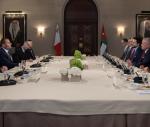You are here
Iran rejects US ban on pick for UN envoy, vows legal action
By Reuters - Apr 12,2014 - Last updated at Apr 12,2014
DUBAI — Iran on Saturday rejected a US decision to deny a visa for its newly appointed ambassador to the United Nations, pledging to take up the case directly with the world body in a dispute that has reopened old wounds dating to the 1979 Islamic Revolution.
The United States, which hosts the United Nations, said Iran's candidate Hamid Abutalebi was unacceptable given his role in a 444-day crisis in which radical Iranian students stormed the US embassy in Tehran and took 52 Americans hostage.
President Barack Obama had come under strong domestic pressure not to allow Abutalebi into the United States to take up his position in New York, raising concerns that the dispute would disrupt delicate negotiations between Tehran and six world powers including Washington over Iran's nuclear programme.
"We have no replacement for Mr. Abutalebi and we will pursue the matter via legal mechanisms envisioned at the United Nations," Abbas Araghchi, a senior foreign ministry official, was quoted by Iran's official IRNA news agency as saying.
“Based on an agreement with the United Nations, America is bound to act according to its international commitments,” Araghchi said, as quoted by IRNA. The United Nations said it had no comment at this time on the US decision.
American law allows the Washington government to bar UN diplomats who are considered national security threats. But Obama’s potentially precedent-setting step could open the United States to criticism that it is wielding its position as host nation to improperly exert political influence.
Araghchi is also a top negotiator in Iran’s talks with big powers on defusing a stand-off over its disputed nuclear activity. Iran has said Washington’s rejection of Abutalebi will not affect the talks, whose next round is set for
May 13.
Abutalebi says he served solely as a periodic translator for the Islamist students who seized the US embassy hostages, and he has since evolved into a moderate figure favouring, like President Hassan Rouhani, a thaw in Iran’s ties with the West.
Since an uproar among former US hostages and US lawmakers over Abutalebi broke out, Tehran has steadfastly stuck by its choice, describing him as a seasoned diplomat who has served in various capacities in Western countries.
‘Capable, rational diplomat’
“Dr Abutalebi is one of the most capable, experienced and rational diplomats in Iran,” Foreign Minister Mohammad Javad Zarif told IRNA. He served as Iran’s UN envoy for eight years before taking his current job last year following Rouhani’s election on a pledge to ease Iran’s international isolation.
In comments posted on Facebook late on Friday, Abutalebi said the US move against him set a “wrong new precedent”.
Vahi Ahmadiah, a hardline conservative cleric who heads the Iranian parliament’s foreign affairs and national security committee, said: “America has no right to inject its issues into an international matter. It has shown [here] its hostile nature again. It uses every chance to hit out at the Islamic republic.”
It was unclear whether the matter might play into the hands of hardliners in Iran’s unwieldy power structure. They are keen to discredit Rouhani’s campaign to improve long-hostile relations with the West, especially Washington, but have been held in check for now by Supreme Leader Ayatollah Ali Khamenei.
Iranian officials privately insist that the dispute should not be allowed to derail diplomacy aimed at a nuclear deal with world powers — crucial to Rouhani’s promise to win Iran relief from punitive economic sanctions.
The nuclear negotiations have also yielded unprecedented bilateral discussions between Iran and the United States.
After former hostages objected to Abutalebi, members of Congress jumped to pass legislation this week banning him, seeing the issue as a chance to look tough on Iran after a new sanctions bill stalled in the Senate early this year.
Many Americans retain bitter feelings about Iran over the hostage crisis and many members of Congress, even Obama’s fellow Democrats, are deeply sceptical about Tehran’s intentions even under the pragmatist Rouhani. They treated Iran’s selection of Abutalebi as a deliberate rebuke of the United States.
Related Articles
Iranian President Hassan Rouhani has selected a new ambassador to represent Tehran at the United Nations, Hamid Abutalebi, a veteran diplomat who has held key European postings in the past, Iranian sources said.
The US House of Representatives unanimously passed legislation on Thursday that seeks to bar Iran’s proposed UN ambassador, Hamid Abutalebi, from entering the United States, three days after its approval by the Senate.
TEHRAN — Iran will react with equal countermeasures if Washington tries to block its oil exports, the foreign ministry said on Tuesday,.Mean















